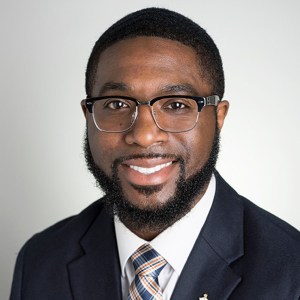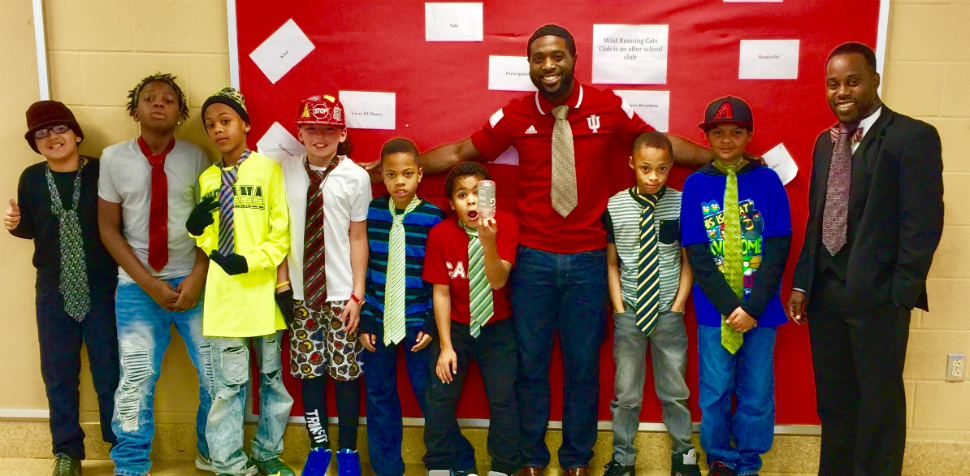Scott Smith, March 16, 2018
At the end of a conversation about his work as a mentor in the grade-school-focused Krimson Leadership Academy, Brian Richardson had a simple way to describe his goal with the organization.
?We're showing you that you can be an honor roll student, an all-A student, and still be cool. Being smart can be cool.?
 The assistant director of diversity and inclusion in the School of Public Health at Indiana University, Richardson finds himself molding the minds of multiple generations of young men and women.
The assistant director of diversity and inclusion in the School of Public Health at Indiana University, Richardson finds himself molding the minds of multiple generations of young men and women.
With Krimson – the deliberate misspelling is a subtle shout-out to his time in the Kappa Alpha Psi fraternity – he speaks with fourth-through-sixth-graders on the importance of seeing yourself as a leader and developing the skills to make it happen.
At Indiana, his role in the School of Public Health begins with recruitment on the high school level and continues through collaboration with programs filled with college-aged men and women who will go on to be doctors, nurses, social workers or fitness trainers.
With all that he?s accomplished, it?s little wonder he earned the 2017 Outstanding Black Male Leader Award from the City of Bloomington?s Commission on the Status of Black Males.
BTN LiveBIG talked to Richardson about his work, Indiana?s diversity and inclusion efforts and why each member of the Krimson Leadership Academy leaves the program with a necktie.
BTN LiveBIG: What is your day-to-day work like?
Brian Richardson: I'm blazing the trails at different high schools talking about, "What is public health?" and having conversations about health disparities within underrepresented populations and communities, implementing different programs to raise the awareness around diversity issues and how it pertains to public health. Then cross-campus collaborations with different community centers on campus, and understanding that we are not a culture center, nor do we operate as such. So we do a lot of collaborative programs with the different culture centers and different identities, and talk about health disparities within those specific populations.
Then the last piece is community outreach. So getting out into the elementary schools, working with volunteer networks, working with non-profit organizations to be a better service to the community.
BTN LiveBIG: How much is health connected to a sort of readiness or ability to experience education?
Richardson: I think it's important. It's very important. I was taught ?if you knew better, you do better.? I think that added knowledge of health, and also stressing the importance of education, kinda go hand-in-hand. Because if I teach you how to live a healthier life now you can improve your community. You can improve your own lifestyle, to start to change your environment and your family structure.
BTN LiveBIG: What kind of goals does Indiana have around inclusivity or diversity?
Richardson: I can speak from our office. One of the things that we're focused on specifically is having conversations about political competency. We're having conversations on uncomfortable topics and uncomfortable issues, and challenging people's bias, and also exposing larger areas where we can grow and learn from our varied perspectives on different topics.
So having conversations around diversity and inclusion, but also approaching the topic of equity versus equality. Just because we're all brought to the table, do we all have the right spoons and forks to eat at the table? So having those conversations and really expanding how people think and view certain concepts around race, sexual orientation, religion, identity. The different areas of who we are and what makes us as individuals.
BTN LiveBIG: There's a lot of conversation right now in the larger media about balancing the ideal of universities as places where you get exposure to lots of different ideas and the ideal of inclusivity and making sure that in exposing people to ideas, they aren?t made to feel as if they are not welcome.
Richardson: Right. So I've given a few lectures on this topic, and this is me speaking from the viewpoint of Brian Richardson [not the university itself], but the research that I've done on the topic and seeing how some campuses have brought on some that are welcome moreso than others to campus to speak, what is the intent behind it? Is there violence that's incited by this person speaking on campus because, if so, then now we have an issue of safety for our students. And at the root of everything it should be about our students.
BTN LiveBIG: How much are you talking about these concepts with the young men you?re mentoring at Krimson Leadership Academy?
Richardson: I think one of the most efficient concepts that comes from the work that I do at IU – and I try to infuse it into the Krimson Leadership Academy – is that finding yourself and creating a space where my students, the participants at the academy, understand that they belong.
We start each session off bringing someone to the front and I'm teaching them the importance of public speaking and having pride in themselves. So we start out each session by saying, "Hello, my name is. This is my age. I'm in this grade. I am a leader," followed by, "I will be successful."
You say something long enough you start to believe it. So if you're constantly coming to this place every Friday for one hour, and you're being told that you are a good kid, that you can be successful, that you can be a leader, that increases the likelihood that [a young man thinks], "You know what? I do matter.?
BTN LiveBIG: What tips do you give students, or these young men, in looking for people in their lives who could possibly be a mentor?
Richardson: My approach so far has been what worked well for me when I was in their shoes: realizing that your mentor doesn't have to be the same gender as you, doesn't have to look like you. That a mentor is someone who's just a good person who sees the best in you who can help bring out those qualities and attributes even when you don't see them in yourself.
BTN LiveBIG: Who do you look to for inspirational leadership? I'm either thinking folks that are close to you that you have a relationship with in your life or folks that are maybe on the national or world stage that you get inspired by.
Richardson: As a kid I was brought up with those sport heroes, but I think at the root of it it was my parents. I'd see my mom, and the sacrifices that she made as a single parent and trying to provide a better community, better opportunity for me and my sister, and who are the people that she's surrounding us by?
As an undergrad I had a picture of Martin Luther King that was on my wall, and Gandhi, and I had that next to my parents any my younger brother, and I would think to myself, "How would I want my younger brother to respond in this situation?" So even though I was older than him, I kind of put myself in his shoes, and I would think, "The decisions and choices that I'm making have a bigger impact than myself because now I have my entire community, I have my city, I have my family, my younger brother who are all looking to me because I'm on this stage now, or I have this platform by being a collegiate athlete. I need to make them proud."
BTN LiveBIG: I was struck by the symbolism of giving these young men a tie and teaching them how to tie it. That feels like a very integral part of the experience for them, and I'm curious about how you came up with that idea, and why you feel it's so important.
Richardson: At the end of our ten weeks of the program I need them to know that I'm invested in their future. Now, as an investment to their future I give them a tie saying, "This is you now becoming a leader of your own faith. A leader of your own future."
As a child, I wasn't taught how to tie a tie. I would have ties, and an older member of my family would tie the tie for me, but it wasn't until I was in my mid-20s that I learned how to tie a tie for myself. It was the pride that I got from learning how to finally do this for myself I wanted to pass that on.







